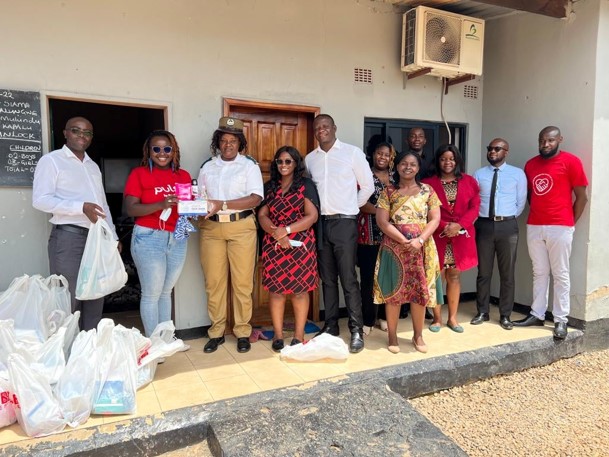My grandparents hail from Luapula. My grandmother was a formidable woman, ahead of her time and extremely industrious. She had 7 years of formal education under her belt and was able to read and write, uncommon among Zambian women in the 70s. Her husband, my grandfather, graduated with a Form 2 education (the equivalent of 9th grade) –considered an extremely high standard of education during that era.
Since their time, there have been deliberate strides by public and private entities to educate the girl child in Zambia. While the educational landscape in the country has improved, UNICEF reports that ‘only 27% of girls in Zambia complete upper secondary school, and among the poorest children, this falls to 3%’. Furthermore, the 2020 Finscope Survey results show that a significant portion of the population has low financial capabilities, with financial inclusion recorded at 71.2% for men and 67.9% for women. This has been attributed to low levels of financial education, which is skewed toward the urban population at 31.9% and 16.2% among rural households.
In September, Prudential Marketing and Comms took a 700-kilometer drive through Zambia to a remote fishing village known as Samfya. Joined by Marc Fancy, Executive Director of the Prudence Foundation, Pia Warburton, and our colleagues from Junior Achievement Zambia, we were excited at the prospect of seeing the Cha-Ching program being implemented in rural Zambia.
After a 10-hour drive and a refreshing evening in the home of the extraordinary Lake Bangweulu (where the water meets the sky), we set out at 7am the next morning for our school visits. As we drove, we saw a number of children in their miserly uniforms walking to school along a dirt road.
Luapula, in Northern Zambia, is one of the 3 provinces in which we are running our Cha-Ching pilot targeting 28,000 children by December 2022. In this largely rural province, we are reaching almost 3400 children in 14 schools through teacher led learning using Cha-Ching comic books and other materials. The comics have been localised to the Zambian context where possible.
One of the schools we visited is called Lubwe Girls Mission School. The unassuming grounds and buildings couldn’t have prepared us for the grand presentation we were about to witness. Lubwe Girls, like many rural schools, is a simple set up of a few structures that serve as classrooms and offices. The ablution facilities are dug out toilets known as pit latrines. Some of the girls walk as far as 8 kilometres to get to and from school and have to contend with extreme poverty, the threat of child marriage, unwanted pregnancies, or all three. The situation from the outside looking in is dire, to say the least
Enter the Rockstar teacher, Euphrasia Mwansa. She has an air of grace about her while at the same time commanding authority. We walked into her classroom and all the grade 5 and 6 girls stood up, ready to roll like a backup choir. True to form, they welcomed us with a song. Nothing about their resounding voices reflected the derelict building we were sitting in. We settled in and Teacher Mwansa, as her pupils call her, began her lesson.
“What are the 4 concepts of Money?” She asked with conviction. Immediately, the girls shot up in batches to respond with hand gestures to boot.
“Earn!”
“Save!”
“Spend!”
“Donate!”
What followed was a comprehensive lesson on Wants and Needs. The girls excitedly read the comics, translating them into their local language for a fuller understanding. They then filled out their exercise forms, carefully detailing their wants and needs, classifying them in a neat budget. Towards what we thought was the end of the lesson, Teacher Mwansa asked them to take their forms home and work in their assigned groups. Instead of leaving, the girls went on to do their group work together, keen to learn more. We sat at the back of the classroom and marvelled at the stellar performance displayed by teacher and pupils. The children had a good grasp on the content and, despite being in rural setting, were able to relate it to their context.
Later, I caught up with Euphrasia and congratulated her on a great lesson. She smiled shyly and said thank you. Euphrasia has been teaching at Lubwa Girls Mission School for 6 years now. From a young age, Euphrasia was passionate about teaching. She would round up the children in her neighbourhood and teach them how to read. “I just like the whole thing. I like imparting knowledge in the learners so that one day they will be like me/ better than me,” she said.
When it comes to the Cha-Ching program, Euphrasia has taken to teaching it, like a duck to water. This is evident in how the children respond and how the classroom lights up as she teaches. She says it is really enjoyable to teach and the learners want to do a lesson every day. Euphrasia believes, “The best part about the program is the 4 concepts of money. At least if learners grasp these 4 concepts, they will grow into responsible citizens. Many a times, us adults fail to manage money because we are lacking these concepts which we needed at a tender age.”
Our rockstar teacher strongly believes in the program’s impact on her and her learners in a positive way. For their Home Economics class, the children earned money, put it together to save up to buy ingredients for a feast, spent it on ingredients that they cooked, and they shared (or donated, if you like) with children from other grades, putting into practice what they had learned during their Cha-Ching sessions. “The same learners were able to assist their friends who couldn't manage to contribute a K10, by doing that, it means they are using the concept of donating” Euphrasia added enthusiastically.
As we drove to our next school visit, we sat in the car and mused over Euphrasia’s teaching and the hope we saw across those faces in the classroom. Even if the children cannot experience the videos and songs in the Cha-Ching program, they were still able to bring the stories to life all thanks to the rockstar teacher from Luapula.








